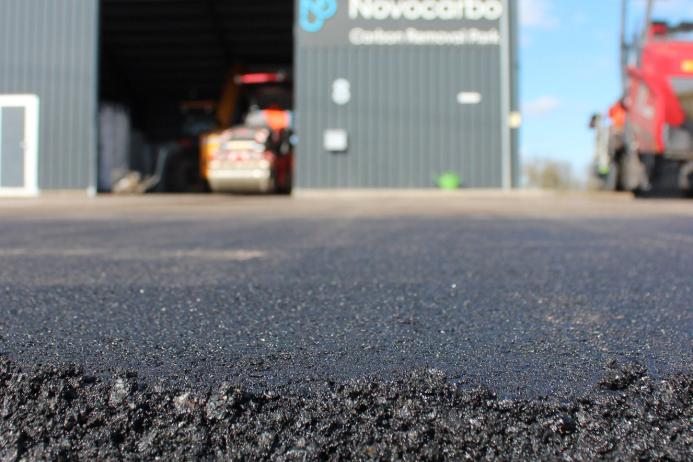Infrastructure and climate change need not be at odds
Carbon removal specialists Novocarbo piloting use of biochar to turn asphalt into climate solution
WHAT if roads could help slow down or even reverse climate change? This bold idea is becoming reality in Northern Germany, where a pioneering pilot project is demonstrating how road construction can become not only more sustainable, but also a part of the climate transition.
Novocarbo GmbH, a leader in carbon removal technologies, have partnered with Hansa Asphalt GmbH to bring a new asphalt mix to the road – one that stores carbon long term while enhancing material performance.
In an innovative pilot project, Novocarbo and Hansa Asphalt have developed an asphalt mix infused with biochar, a carbon-rich material made from plant waste. The test has delivered promising results and may lay the groundwork for future standards in road construction.
‘If we succeed in turning road construction into a means of storing carbon, it opens up a whole new perspective for the infrastructure sector,’ said Caspar von Ziegner, chief executive officer of Novocarbo. ‘Biochar can not only ease the burden on the climate, but also deliver functional advantages.’
The pilot took place at the Carbon Removal Park Baltic Sea in Mecklenburg-Western Pomerania, where fine-grained biochar (–5mm) was added at a 3% ratio to the top layer of asphalt – approximately 7 tonnes in total.
The results show several key advantages:
Greater material efficiency: same mix volume, more surface coverage
Raw material substitution: potential to replace filler materials or even bitumen
Permanent carbon storage: creation of carbon removal credits.
Additional analyses, including core sample testing, are under way to examine long-term performance benefits such as:
Higher durability: better resistance to temperature fluctuations and aging
Improved stability: reduced rutting and increased stiffness.
According to Novocarbo, studies and initial laboratory results support these findings: In suitable mixtures and with the right formulation, biochar increases the viscosity of asphalt binders.
The project captured permanently around 75kg of CO2 equivalent per tonne of asphalt – totalling 17.5 tonnes across the test site. These carbon savings are certified by Novocarbo as Carbon Removal Credits and independently verified. The credits can be sold to companies seeking to offset unavoidable emissions.
This combination of technical functionality and climate impact makes biochar a powerful lever for sustainable construction projects. With the global asphalt market is projected to surpass US$370 billion by 2032, and pressure to decarbonize mounting, biochar could play a key role, if regulatory requirements, such as limits on polycyclic aromatic hydrocarbons (PAHs), are met.
A commercial launch is scheduled for fall 2025. Meanwhile, Novocarbo are expanding testing and forging new partnerships with construction firms and research institutions. ‘Our vision is scalable, climate-friendly infrastructure – starting with roads but extending far beyond,’ said Mr von Ziegner.










